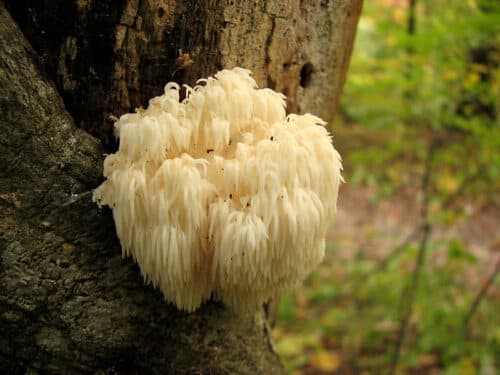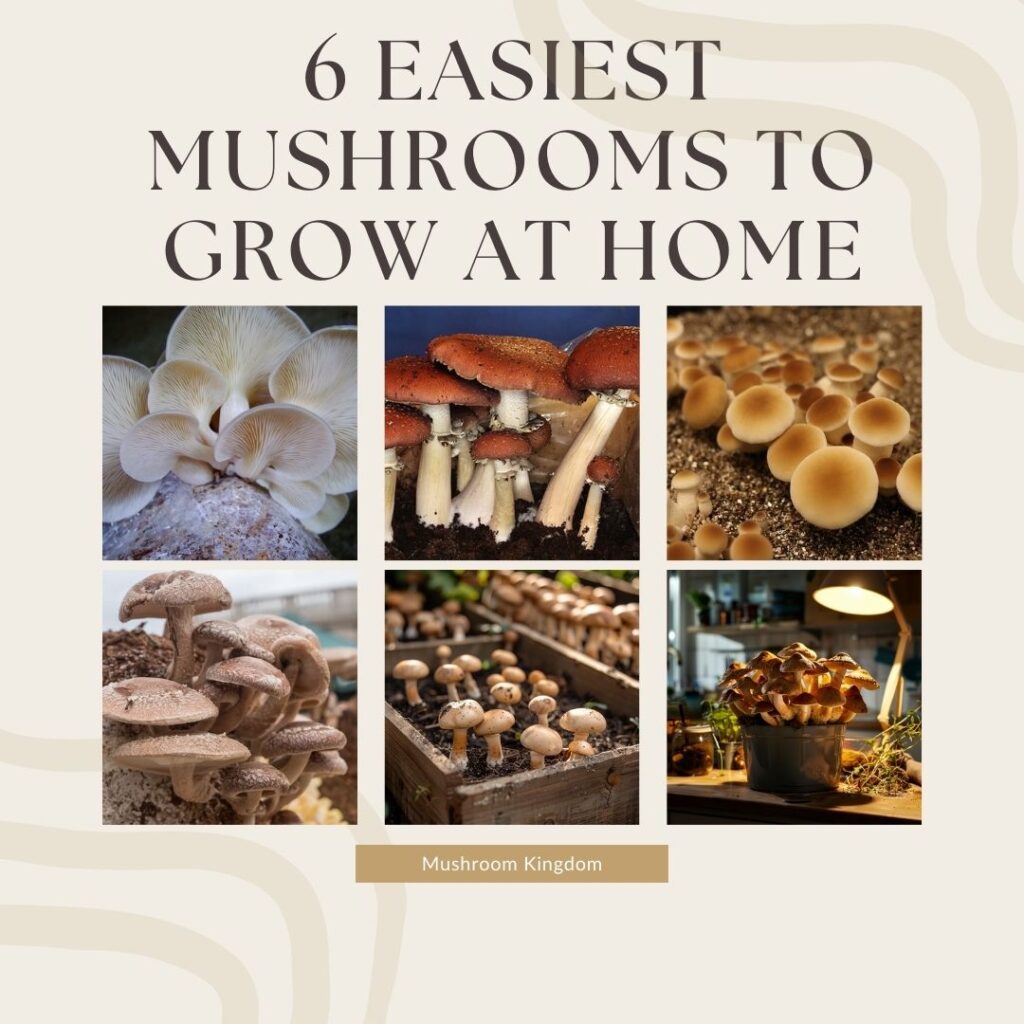Lion’s Mane Mushroom (Hericium erinaceus) is an extraordinary fungus known for its unique appearance and impressive health benefits. Resembling a lion’s mane with its cascading spines, this mushroom has been a staple in traditional Chinese medicine for centuries.
Recently, it has gained popularity in the West for its potential cognitive and health-boosting properties. Let’s dive deeper into what makes this mushroom so special.

Identification Guide
Identifying Lion’s Mane is relatively easy due to its distinctive look. Here are the key features to look for:
- Shape and Appearance: this mushroom is easily recognizable by its white, fluffy, and pom-pom-like appearance. The spines or teeth, which can grow up to 2.5 centimeters long, hang down like icicles, giving the mushroom its characteristic look.
- Size: These mushrooms can vary in size but generally grow between 5 to 40 centimeters in diameter. They often form large, single clumps on the trunks of hardwood trees.
- Habitat: It typically grows on dead or dying hardwood trees such as oak, walnut, beech, and maple. You can find them in late summer and fall.
- Texture and Smell: The mushroom has a firm texture and a mild, seafood-like smell when fresh. When cooked, it takes on a more robust, savory aroma.
By familiarizing yourself with these features, you can confidently identify Lion’s Mane mushrooms in the wild.
Is lion’s mane mushroom Edible?
Yes, these mushrooms are not only edible but also highly sought after for their culinary and medicinal properties. When it comes to cooking, it offers a versatile and delicious option. Here are some reasons why it’s considered a gourmet delicacy:
- Flavor Profile: The taste of Lion’s Mane is often compared to seafood, particularly crab or lobster. This unique flavor makes it a great addition to various dishes.
- Texture: When cooked, they develop a meaty, tender texture that holds up well in various cooking methods.
- Nutrient-Rich: These mushrooms are packed with nutrients, including protein, fiber, vitamins, and minerals.
Foraging or purchasing from a trusted source ensures that you get a fresh and safe product to enjoy in your meals.
Health Benefits of lion’s mane mushroom
Lion’s Mane mushrooms are more than just a tasty addition to your diet. They offer a wide range of health benefits that have been backed by scientific research. Here are some of the key health benefits:
- Cognitive Function: One of the most notable benefits is its potential to enhance cognitive function. Studies have shown that it may promote nerve growth factor (NGF) production, which is essential for the growth and maintenance of neurons. This can lead to improved memory, focus, and overall brain health.
- Nervous System Support: they may help protect the nervous system from damage and promote the regeneration of nerve cells. This makes it a potential therapeutic option for neurodegenerative diseases such as Alzheimer’s and Parkinson’s.
- Immune System Boost: The mushroom contains polysaccharides and beta-glucans, which can enhance the immune system’s function by stimulating the activity of white blood cells.
- Digestive Health: Lion’s Mane has anti-inflammatory properties that can help reduce inflammation in the digestive tract, promoting better gut health. It may also protect against stomach ulcers by inhibiting the growth of H. pylori bacteria.
- Anti-Cancer Properties: Some studies suggest that this mushroom may have anti-cancer effects due to its ability to induce apoptosis (programmed cell death) in cancer cells and inhibit tumor growth.
- Mental Health: Preliminary research indicates that it can help alleviate symptoms of anxiety and depression. It is thought to improve mood and reduce stress by modulating the levels of neurotransmitters.
Incorporating lion’s mane mushroom into your diet can contribute to overall well-being and address various health concerns.
How to Cook Lion’s Mane
Cooking lion’s mane mushroom is simple, and their versatility allows for creativity in the kitchen. Here are some popular methods to prepare and enjoy them:
Sautéed Variation
Ingredients:
- Fresh lion’s mane mushroom
- Olive oil or butter
- Garlic, minced
- Salt and pepper to taste
Instructions:
- Clean the mushrooms by gently brushing off any dirt. Avoid washing them with water to prevent them from becoming soggy.
- Slice the mushrooms into thick pieces.
- Heat olive oil or butter in a pan over medium heat.
- Add minced garlic and sauté until fragrant.
- Add the mushroom slices and cook for about 5–7 minutes on each side until golden brown.
- Season with salt and pepper to taste.
- Serve as a side dish or add to salads, pastas, or sandwiches.
Lion’s Mane “Crab” Cakes
Ingredients:
- 1 pound of mushrooms, shredded
- 1 egg, beaten
- 1/4 cup mayonnaise
- 1 teaspoon Dijon mustard
- 1 teaspoon Old Bay seasoning
- 1/2 cup breadcrumbs
- Salt and pepper to taste
- Olive oil for frying
Instructions:
- In a bowl, mix shredded mushrooms, egg, mayonnaise, mustard, Old Bay seasoning, breadcrumbs, salt, and pepper until well combined.
- Form the mixture into patties.
- Heat olive oil in a pan over medium heat.
- Fry the patties for 3–4 minutes on each side until golden brown.
- Serve with a dipping sauce or as a sandwich filling.
Delicious Soup
Ingredients:
- Fresh mushrooms, chopped
- 1 onion, diced
- 2 cloves garlic, minced
- 4 cups vegetable broth
- 1 cup coconut milk
- Salt and pepper to taste
- Fresh herbs for garnish (optional)
Instructions:
- In a pot, sauté onion and garlic until translucent.
- Add chopped Lion’s Mane mushrooms and cook until they release their moisture and begin to brown.
- Pour in vegetable broth and bring to a boil. Reduce heat and simmer for 15–20 minutes.
- Add coconut milk and season with salt and pepper.
- Garnish with fresh herbs and serve hot.
Lion’s Mane mushrooms offer a delightful culinary experience while providing numerous health benefits. Whether you are a forager, a foodie, or someone interested in natural health remedies, adding Lion’s Mane to your diet can be a rewarding and nutritious choice.
Can You Eat Lion’s Mane Raw?
Yes, you can eat Lion’s Mane mushrooms raw, but it is not commonly recommended. When consumed raw, Lion’s Mane mushrooms have a spongy texture and a mildly bitter taste, which some might find unpalatable.
Cooking these mushrooms not only enhances their flavor, making them taste similar to seafood like crab or lobster, but also improves their texture, rendering them tender and meaty.
Moreover, cooking can help break down any potential toxins and increase the bioavailability of their beneficial compounds, such as polysaccharides and beta-glucans.
These compounds contribute to the mushroom’s health benefits, including boosting cognitive function and supporting the immune system. Therefore, while it is safe to eat Lion’s Mane mushrooms raw, cooking them is a better choice to fully enjoy their taste and health advantages.


